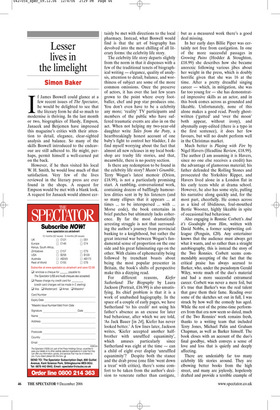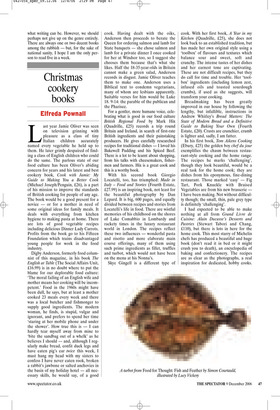Lesser lives in the limelight
Simon Baker
If James Boswell could glance at a few recent issues of The Spectator, he would be delighted to see that the literary form he did so much to modernise is thriving. In the last month or two, biographies of Hardy, Empson, Janacek and Betjemen have impressed this magazine’s critics with their attention to detail, elegance, clear-sighted analysis and balance. So many of the skills Boswell introduced to the endeavour are still adhered to. He might, perhaps, permit himself a well-earned pat on the back.
However, if he then visited his local W. H. Smith, he would lose much of that satisfaction. Very few of the lives reviewed in the literary press are ever found in the shops. A request for Empson would be met with a blank look. A request for Janacek would almost cer tainly be met with directions to the local pharmacy. Instead, what Boswell would find is that the art of biography has devolved into the most chilling of all literary forms: the celebrity life story.
The celebrity life story departs slightly from the norm in that it dispenses with a few of the traditional tenets of biographical writing — elegance, quality of analysis, attention to detail, balance, and worthiness of subject are some of the more common omissions. Once the preserve of actors, it has over the last few years grown to the point where every footballer, chef and pop star produces one. You don’t even have to be a celebrity any more; ‘reality’ TV participants and members of the public who have suffered traumatic events are also in on the act. When not helping my two-year-old daughter write Tales from the Potty, a heartbreakingly honest account of one baby’s fight to control her bladder, I do find myself worrying about the fact that almost all new releases in my local bookshop are trashy life stories, and that, meanwhile, there is no poetry section.
Is there any redemption to be found in the celebrity life story? Mustn’t Grumble, Terry Wogan’s latest memoir (Orion, £18.99), is not a particularly promising start. A rambling, conversational work, containing dozens of bafflingly humourless ditties sent in by his listeners (and so many ellipses that it appears ... at times ... to be interspersed ... with ... Morse code), the book entertains in brief patches but ultimately lacks coherence. By far the most dramatically arresting struggle is not that surrounding the author’s journey from provincial banking to a knighthood, but rather the great internal war between Wogan’s fundamental sense of proportion on the one side and his great fulminating ego on the other. With claims of ephemerality being followed by trenchant boasts about being the most popular presenter in Britain, the book’s shifts of perspective make this a dizzying read.
For different reasons, Kiefer Sutherland: The Biography by Laura Jackson (Portrait, £16.99) is also unsatisfying. Its chief problem is that it is a work of unabashed hagiography. In the space of a couple of early pages, we have Sutherland ‘to his credit’ not using his father’s absence as an excuse for later bad behaviour, after which we are told, ‘As Jack Bauer [in 24], Kiefer has never looked better.’ A few lines later, Jackson writes, ‘Kiefer accepted another halfbrother with unruffled equanimity’, which amuses particularly since Sutherland was eight at the time — can a child of eight ever display ‘unruffled equanimity’? Despite both the stance and the drab prose (one film ‘went down a treat’ with critics), there’s some comfort to be taken from the author’s decision to venerate rather than castigate, but as a measured work there’s a good deal missing.
In her early days Billie Piper was certainly not free from castigation. In one of the more successful passages in Growing Pains (Hodder & Stoughton, £18.99) she describes how she became anorexic following various jibes about her weight in the press, which is doubly horrific given that she was 16 at the time. After a pretty dreadful singing career — which, in mitigation, she was far too young for — she has demonstrated impressive skills as an actor, and in this book comes across as grounded and likeable. Unfortunately, none of this alone makes a good read. Poorly ghostwritten (‘gutted’ and ‘over the moon’ both appear, without irony), and abysmally copy-edited (there is a typo in the first sentence), it does her few favours, but will no doubt perform well in the Christmas market.
Much better is Playing with Fire by Nigel Havers (Headline Review, £18.99). The author (I am assuming it is Havers, since no one else receives a credit) has the advantage of glamorous material; his father defended the Rolling Stones and prosecuted the Yorkshire Ripper, and Havers lived alone in a London flat in his early teens while at drama school. However, he also has some style, pulling his narrative along quickly and, for the most part, cheerfully. He comes across as a kind of libidinous, foul-mouthed Bertie Wooster, highly likeable in spite of occasional bad behaviour.
Also engaging is Ronnie Corbett’s And it’s Goodnight from Him, written with David Nobbs, a former scriptwriting colleague (Penguin, £20). Any entertainer knows that the audience must always get what it wants, and so rather than a straight autobiography, this is instead the story of the Two Ronnies. Corbett seems commendably accepting of the fact that the critical praise has always accrued to Barker, who, under the pseudonym Gerald Wiley, wrote much of the duo’s material and had a more successful extramural career. Corbett was never a mere foil, but it’s true that Barker’s was the real talent that gave them their fame. Reading over some of the sketches set out in full, I was struck by how well the comedy has aged. While the rest of the prime-time performers from that era now seem so dated, much of the Two Ronnies’ work remains fresh, thanks to a writing team that included Terry Jones, Michael Palin and Graham Chapman, as well as Barker himself. The book closes with an account of the duo’s final goodbye, which conveys a sense of love and loss that is quietly and deeply affecting.
There are undeniably far too many celebrity life stories around. They are elbowing better books from the high street, and many are joylessly, hopelessly drafted and provide a terrible example of what writing can be. However, we should perhaps not give up on the genre entirely. There are always one or two decent books among the rubbish — but, for the sake of national sanity, I hope I am the only person to read five in a week.



























































































 Previous page
Previous page